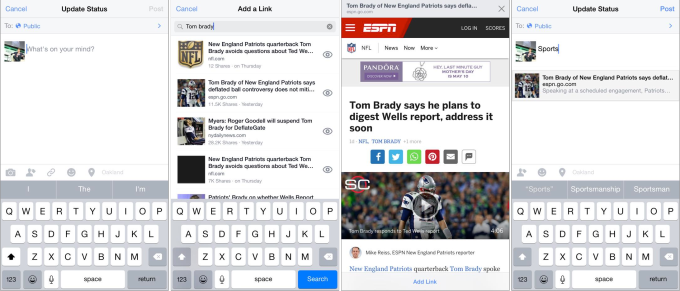Facebook testing its own search engine, so users don’t have to leave the site to find links
Select iOS users are seeing the update, which gives users articles they’re likely to share

Facebook could be about to release its own search engine, letting users find articles to share with their friends alongside their status updates.
At the moment, users must paste in the URL of a page if they want to share it. But some iOS users are seeing a version of the app where they are offered an “add a link” option, which they can click and then search for articles to share.
Clicking on the option gives users a search box, into which they can type their query. They then get results sorted by their likelihood to be shared, with recently-published articles and those posted by others being prioritised.

When users pick the article they want to share from the list, they can add things like a status update, location or emoji as normal.
Initially, the feature has only been rolled out to iOS users in the US. But the site told Techcrunch that it is “piloting a new way to add a link that’s been shared on Facebook to your posts and comments”.
Facebook also told Techcrunch that it had indexed over one trillion posts to power the search engine, looking through users’ feeds to find out which articles had been shared more than others. That socially-powered search is likely to be the Facebook search engine’s selling point over Google, which doesn’t have access to the same data about what articles are being shared and by who.
Increasing the amount of traffic that newspapers and other publishers get from Facebook means that news feeds are filled but also that those publishers are encouraged to keep up active followings on the site and occasionally buy ads. The site has become a huge source of referrals in recent years and making it easier to share articles is likely to increase that yet more.
But the button could also be a move away from one of the site’s more controversial recent strategies, which will see content from publishers including the New York Times hosted on Facebook rather than on their own pages, with the social network sharing revenues with newspapers.
Join our commenting forum
Join thought-provoking conversations, follow other Independent readers and see their replies
Comments